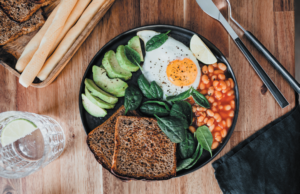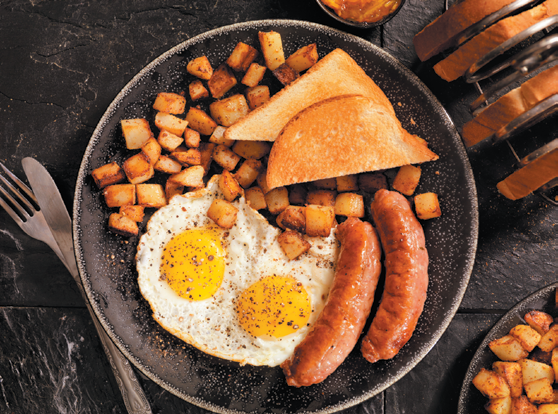When it comes to breaking the overnight fast, whether to eat breakfast—and what to eat if you do—can be a confusing topic. The fact is, if you do it right, the morning meal can offer an important opportunity to nourish your body, and it may help with weight control.
What to Eat: Typical American breakfast foods—like processed meats (bacon, sausage, and ham); refined flour pastries, pancakes, and French toast; high-sugar cereals; and fried potatoes—are generally not ideal.
“Breakfast is a great opportunity to bring in foods which we may be falling short on, such as dairy products (milk, yogurt, cottage cheese, or fortified milk substitutes), whole grains, and fruits and vegetables.” says Alice H. Lichtenstein, DSc, director of the Cardiovascular Nutrition Laboratory at the Human Nutrition Research Center on Aging and executive editor of Tufts Health & Nutrition Letter. A bowl of whole-grain hot or cold cereal, plain yogurt with granola, or cottage cheese topped with fresh or frozen fruit and nuts is a quick, simple, nutritious, and satisfying way to break your fast. A slice of whole grain toast or a whole wheat wrap makes a great base for peanut or other nut butter and banana or apple, melted cheese and tomato, mashed beans and salsa, or mashed avocado and hard-boiled egg.
Eggs are a fine breakfast choice, in moderation. “An egg a day or a couple of eggs every other day seems to be fine for most people in terms of heart health,” says Lichtenstein. “If your doctor recommends limiting egg intake, use egg whites or egg substitute.”
Consider looking beyond the limited definition of what constitutes ‘breakfast food.’ “You never know what you will hit on that strikes your fancy,” says Lichtenstein. “Explore the breakfast foods of different cultures and cuisines.” See Quick and Simple Healthy Breakfasts for more ideas.

- Eat it. Breakfast eaters seem to have better overall diet quality and health outcomes. Whether this is due to breakfast itself or other lifestyle choices of habitual breakfast eaters is not certain.
- Make healthy choices. Breakfast is the ideal time to incorporate some foods that are often shortchanged. Go for dairy for calcium and vitamin D, fruit for potassium and phytochemicals, nuts and seeds for fiber, healthy fats, vitamin E, and magnesium, and whole grains for fiber and minerals. Skip the processed breakfast meats, heaps of salty fried potatoes, sugary breakfast cereals and bars, and refined baked goods such as white bread, bagels, rolls, pastries, and muffins.
- Include a protein source. Spreading protein intake out throughout the day is the optimal way to support the ongoing building and repair of your muscles and the rest of your body.
- Branch out. Get creative, look to international flavors, eat lunch or dinner foods for breakfast, or otherwise consider breaking away from “traditional” American breakfast foods.
Try to include a protein source at breakfast, as research shows spreading protein intake out throughout the day is ideal (see this month’s Special Supplement for more information).
Nutritional Bonus. What we eat (and don’t eat) is more important than whether we eat (or don’t eat) breakfast. Over a day, regular breakfast consumers tend to have more nutrient-dense diets and healthier overall dietary patterns. A recent study found skipping breakfast or lunch caused people to fall short on intake of fruits, whole grains, and dairy. Intake of sodium and refined grains went up on days when meals were skipped (see December 2020 NewsBites for more information). Data from an international review found that, while people who didn’t eat breakfast were more likely to eat fewer calories in the day, breakfast eaters consumed more fiber, more of several essential vitamins and minerals, and less added sugars.
Health Benefits. Breakfast eating and skipping have been studied with regard to weight management, diabetes risk, and association with other chronic diseases, including cardiovascular disease. Research overall comes out in favor of breakfast, although there are some caveats.
A recent analysis of randomized, controlled, short term studies found skipping breakfast may have a modest benefit in terms of weight loss. But other studies, particularly longer-term observational studies, indicate people who regularly eat breakfast tend to weigh less. The analysis of randomized controlled trials also found skipping breakfast resulted in an increase in LDL (bad) cholesterol levels compared to eating breakfast.
Multiple observational studies find an association between skipping breakfast and higher risk of type 2 diabetes. These studies suggest that a regular healthy breakfast is associated with improved blood sugar control. Other studies reported an association between breakfast consumption and lower risk of cardiovascular disease.
The impact of meal skipping is very difficult to study. “There are so many factors at play,” says Lichtenstein. “Can one really parse out the health impacts of eating breakfast if one participant eats a heaping plate of syrup-drenched refined-grain pancakes and a side of bacon every day, and another eats fruit with yogurt or steel cut oats? Are breakfast eaters healthier because they have other healthy eating habits, engage in more physical activity, or live less stressful lives? Are people who skip breakfast more likely to work the nightshift, snack heavily throughout the evening, or eat because they are depressed, all of which could impact their health?”
Whatever your health goals, starting your day—whenever your day starts—with smart food choices is a good way to support your efforts.
- Bowled over. Assemble a bowl of plain Greek yogurt or low-fat cottage cheese and add toppings like fruit, nuts, and low sugar whole oat granola or muesli. Sprinkle with cinnamon or add a dash of vanilla for extra flavor.
- Toast toppers. Add quick, nutritious toppers to a slice of whole grain bread or English muffin, like peanut or other nut butter and sliced fruit or raisins; hummus with feta and olives; avocado and salsa; or hard-boiled egg and tomato.
- Fill ‘em up. Whole grain pita and tortillas are easy to stuff or roll with hard-boiled or scrambled egg, cooked chicken or shrimp, or canned tuna. Top with veggies like spinach, tomato, and mushrooms. Add a tasty sauce or spread, like salsa, mustard, or a dollop of plain yogurt to taste.
- Overnight options. Most whole grains (including oats and quinoa) and some seeds (like chia seeds) can be soaked in liquid (milk, fortified milk substitute, water, or broth) while you sleep. In the morning, top with fresh or frozen fruit, nuts, cinnamon—or go savory and top with chopped fresh, thawed, or canned vegetables and protein, like tofu, shredded cheese or lean sliced meats. Try different proportions and combinations until you find your favorites.

























What is cost of tufts nutrition letter? how many issues do I get every month?
Please start my issues and I will pay with my Visa credit card.
Deliver all my issues to my address at Daniel H Ziegler. 12800 NE 4th St. , Apartment 1, Vancouver WA. 98684-5052.
Please answer my questions . My phone number is (360) 260-0144;
My email is more likely to reach me sooner at: dhz@peak.org.
When speaking into my phone recording device, speak slowly and clearly pronounce every word in your message. keep your message very short. I’m 85 years old with a slow brain and bad hearing1
I think I ordered a copy of your nutrition book that I hope tells me the foods that will benefit the major parts of my 85 year old body. For example, what should I eat, or rub onto my finger nails to keep them from cracking and getting them caught with my
clothes I wear?
Do you have any record of any book like this hat I’ve ordered in the past year?
What foods will give me the most regular and easy to relieve intestines?
I like to eat ceriels for high fiber foods. Are wheat cerials or oat cerials better for me?
Subscription options are available here: https://www.nutritionletter.tufts.edu/subscribe/